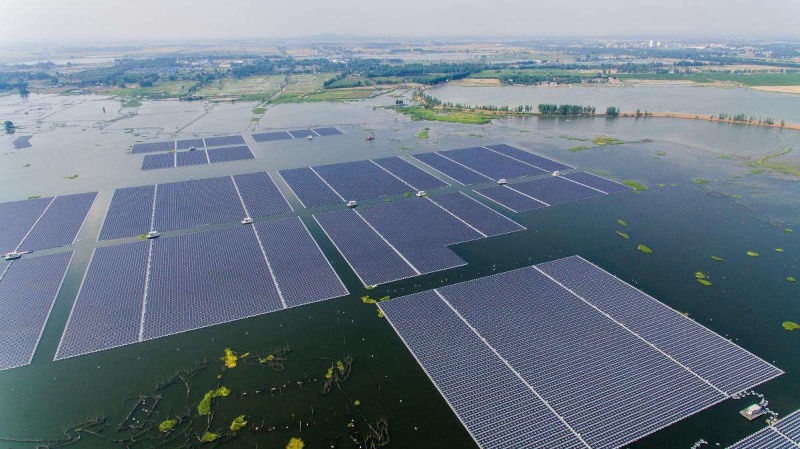Three Gorges New Energy Floating Solar Farm, China. Image Credit: YSG Solar
The British are known to talk about the weather, a lot. Some say it’s just an icebreaker or awkward silence filler topic but the main reason is that the weather is mostly terrible. The same applies to Zimbabwe when it comes to the electricity situation. We can’t help but talk about it.
As I write this, the Zimbabwe Power Company says we are producing 567MW from all our sites. This is against a peak demand of 2200MW in winter, which we are probably close to with the chilly weather we’ve had lately.
We are producing around 26% of the electricity we need and it is no wonder then that we have rolling 18-hour power cuts.
This explains why the majority of Zimbabweans are turning to solar for their power needs. Zimbabwe is now the biggest adopter of solar systems in Africa. Families and businesses alike are turning to sun-power.
We found out recently that even government ministries and departments have turned to solar too. The Solar for Health project has saved lives by making sure health centres, especially in rural areas, have the electricity they need to offer life-saving operations to pregnant women.
That’s all well and good but we should really adopt solar as a nation now. Not the haphazard way we are currently doing it. Granted, there are a few solar projects that have been announced.
The government should lean into solar, adjust its duties and taxes on solar equipment, incentivise adoption by businesses, arm the relevant authorities to make sure we only import the right quality equipment etc.
To top it off, we need the government itself to properly adopt solar and floating solar panels could be the right fit for Kariba.
Floatovoltaics
It’s a simple idea really. Instead of installing panels on rooftops and on the ground, solar panels are placed on rafts and float atop water bodies. Lake Kariba, the largest man-made water reservoir in the world, would be perfect for this with its 5,580 km2 surface area.
Of course, we couldn’t cover the whole lake with solar panels but we should have a significant area to work with for the floatovoltaics project.
We have to leave space so sunlight can reach the plants below so they can produce oxygen for the fishes. Some area for fishing those fishes and recreational activities would have to be reserved too but with 5,580 km2 to work with, we would still be good.
Researchers say 30% of the surface area should be good.
Why this would be a good idea
The first and obvious advantage is the extra electricity we would generate from these floating panels. Researchers say thousands of cities across the world could power themselves entirely from such floating panels. I think Kariba would be a good candidate too.
The second advantage of these floatovoltaics is that they would reduce evaporation. Researchers project major water savings.
In late 2022 we dealt with record-low water levels at Kariba which resulted in power generation being stopped completely at some point. Water levels were 477.90m (16.70% usable storage) on 13th March 2023.
An increase in rainfall activity led to improvement but we are still susceptible to what happened last year. We have been getting droughts more frequently in the last couple of decades, so the risk that evaporation poses is real. Floating panels would help us conserve the water we do have.
Low water levels mean less hydroelectricity and so the floating panels would help keep Kariba operating closer to full capacity. So, we are looking not only at the extra electricity generated from the floating panels but also at improved/guaranteed hydroelectric power.
The relationship is not one-sided, the hydro gives to the solar too. If you’ve ever been to Kariba, you know how hot it gets up there.
Well, it sounds a little off but solar panels do not actually operate optimally in great heat. Great heat reduces solar panels’ efficiency by up to 25% apparently. Solar cells produce solar power most efficiently between 15°C and 35°C.
When those solar panels are floating atop Kariba, the water would help cool them, keeping them in the sweet 15-35°C range.
To sweeten all the advantages above, moving our solar panels to the waters means they would no longer compete with agricultural or conservation projects.
It’s already happening around the world
Floatovoltaics are popular in Asia, with the top 5 all coming from the continent. The biggest, Dezhou Dingzhuang Floating Solar Farm in China produces 320MW.
Some countries, including the US, are getting in on the action too. I think Zimbabwe could do well to look in this direction too.
What do you think about all this? Do let us know in the comments section below.
Also read:
Zimbabwe’s unreliable electricity supply makes it the biggest adopter of solar systems in Africa
They are now printing solar panels on paper like newspapers, would be great for Zim

What’s your take?